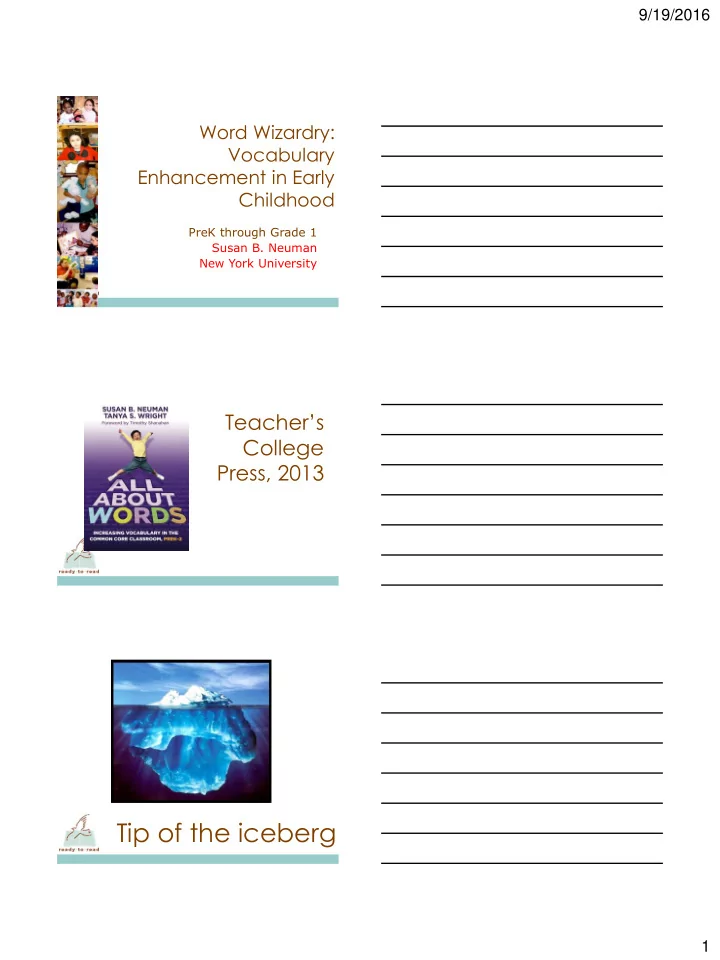

9/19/2016 Word Wizardry: Vocabulary Enhancement in Early Childhood PreK through Grade 1 Susan B. Neuman New York University Teacher’s College Press, 2013 Tip of the iceberg 1
9/19/2016 o Knowledge o Symbolic representations o Build concepts All about words Poll question o Vocabulary is THE strongest predictor of children’s achievement o Not only in elementary school but in high school Relation to other skills 2
9/19/2016 o Children of poor, marginalized populations o Children of families who speak a language other than English o Mother’s education Risk factors Hart and Risley… Poverty 3
9/19/2016 NAEP 2012 o Cumulative model of expectations o Academic Vocabulary o Building knowledge through texts o Creating cross-textual experiences o Integrating technology and print o A focus on evidence Career and College Ready Standards NAEP 2012 4
9/19/2016 o The numbers are larger than you can imagine No. of words children will need to know Poll question o Children are ‘word sponges’ o They learn words through day to day activities o They learn through ‘teachable moments’ Common myths 5
9/19/2016 Poll question o Children will need explicit AND implicit instruction o Explicit: A ‘cave’ is a hole in the mountain” o As opposed: What is a cave? Key principles o Be intentional in our word selection o Words from core reading program o Platypus o Around o OR: o Ride o move o Question: are these words important? Key principle 6
9/19/2016 o INSTEAD: insects, antennae, segments, legs o Parts of the body: brain, heart, lungs Knowledge networks o Camouflage o Habitat o Survival Key principle o Ongoing professional development Key principle 7
9/19/2016 Creating a vocabulary rich environment Creating cozy spots for reading curiosity 8
9/19/2016 o Purposeful talk: Why do you think? o Challenging words: meterologist o Extend and clarify o “Taking it up a notch” o Compare/contrast o If/then Oral language Eye to eye instruction 9
9/19/2016 o Implicit instruction o Explicit instruction Building vocabulary Poll question o The problem o “ A space probe is an unpiloted spacecraft that leaves Earth ’ s orbit to explore the Moon, planets, asteroids, comets, or other objects in outer space as directed by onboard computers and/or instructions sent from Earth. ” o Building Grade 6 text o vocabulary 10
9/19/2016 o ‘asteroid’ o ‘comet’ o ‘Atmospheric conditions’ o ‘space probes’ o What is similar about them? Difficult words o Traditionally, much instruction has been designed around themes food cart grocery store cash register thematic vs. categories o We teach children words and content in categories living things insect reptile moth mosquito wasp alligator thematic vs. categories 11
9/19/2016 o Not necessarily ‘tier II’ words o Not necessarily ‘academic’ words o Rather they are ‘content - specific’ words: words that are essential for learning content • STEP 1 Difficult words o Plants o Stems, petals, leaves, o Photosynthesis; oxygen and carbon dioxide o All about me o Heart, lung, brain, blood An example o A common teaching sequence o Identify words: 8-10 o Child-friendly definition “A dolphin is a marine mammal. It looks o like a fish but it has lungs and breathes air just like us” • STEP 2 How do we go about teaching vocabulary? 12
9/19/2016 o Give children many opportunities for guided practice. o Pictures; rhymes; riddles; o Call and response techniques Step 3 o Distributed review o Over learning o Weekly, monthly, and over time Step 4 o Progress monitor Step 5 13
9/19/2016 New words o Teach content-rich words ( 5-step series) o + o Make sure these words are related in categories ( to form a semantic network) o = o SELF TEACHING DEVICE o Ex: Is a spider an insect? A spider has 8 legs, and all others have 6, so it is not a spider To summarize o Text sets Materials to use 14
9/19/2016 o Focus on a topic of interest o A series of books that use multiple genre o Pattern books or predictable books o Narrative nonfiction o Informational Features of text sets o Daily readings of books in text sets o Start with predictable books (gives children the names they can remember) o Move on to narrative nonfiction; spend at least two times a week reading these books o Turn to Information books Activities o Supports word knowledge and conceptual development o Enables children to develop ‘inter - textual links’ as they compare and contrast across genres o Helps them to learn the ‘features of information books.’ Why is it powerful? 15
9/19/2016 Evidence Poll question o Principles: o The notion of acceleration o Content-rich vocabulary o Organization of word knowledge o Use of text sets o Gradual release of control o Lots of practice and distributed review o Don’t be afraid of challenging students; they love it! Reducing disparities 16
9/19/2016 Book: All About Words (Teachers ’College Press, 2013) Project Website: http://readytolearnresearch.org/ Contact: Prof. Susan B. Neuman Email: sbneuman@nyu.edu Contact information 17
Recommend
More recommend